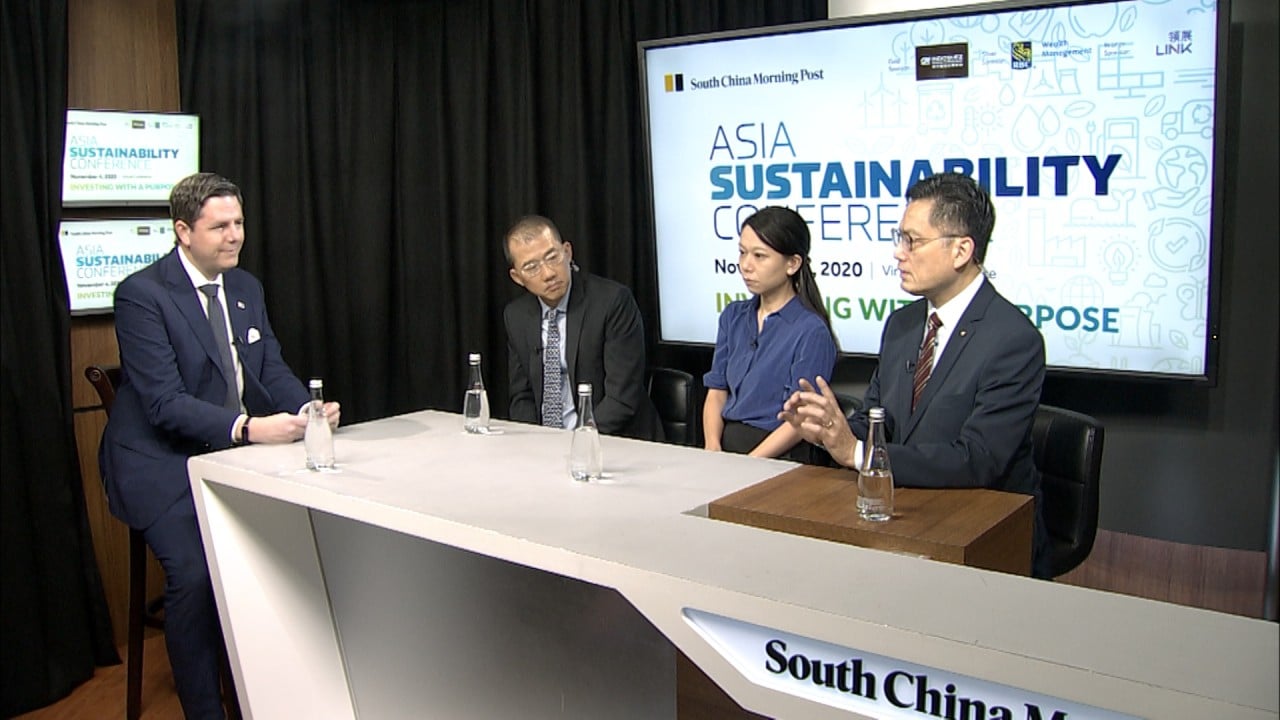
Hong Kong finance minister banking on green shoots of economic recovery lying in environment, sustainable development, says source
- Financial Secretary Paul Chan to target creation of green ecosystem in Wednesday’s budget
- Chan cautions city may have to brace for austerity as he tempers expectations of any sweeteners for residents
Battling an estimated deficit of up to HK$300 billion (US$38.5 billion), Financial Secretary Paul Chan Mo-po is expected to temper expectations over any cash handout, and instead focus on securing a slice of the green finance pie, which was worth an estimated US$350 billion globally last year.
But Chan has only committed to pressing ahead with more public projects, while flagging concerns over the increase in recurrent public spending by 25 per cent in the past three years.
While he is expected to roll out measures to tackle problems arising from a 7 per cent unemployment rate, close to a 17-year high, on Sunday he cautioned that the city would have to brace for some austerity.

Chan’s green focus has even extended to the colour of the cover of this year’s budget, representing hope for the future, and he continued the theme in his weekly blog.
“No matter if it’s just a small blade of grass or a tall tree, they both start from a tiny seed – but one that keeps its infinite vitality hidden,” he wrote.
“We need to be more pragmatic given the huge deficit, but the government hopes to invest in the city’s environment at the same time to strengthen the role as an international green finance hub,” the source said, while declining to confirm if Chan would issue more green bonds this year.
The epidemic will pass, and difficulties will be overcome, and the changing environment will just make us more resilient
But economist Andy Kwan Cheuk-chiu said the focus on green initiatives, while increasing participation from more stakeholders, would not push the economy forward in the short term.
“The effect of these things would not be directly felt by Hongkongers, the budget should be talking about how to save the economy,” he said. “I think it needs to look at sectors that have been hardest hit by the pandemic, such as tourism and retail, and figure out how to help them after restrictions can be lifted.”
Kwan said he agreed with reducing sweeteners for people already within the social welfare system, such as those in public housing, but suggested more support for middle-class families, who had been losing income over the past year, to encourage consumption and move the economy forward.
Green finance aims to move financial flows towards sustainable development, with a main target of managing social and environmental risks, while delivering a decent rate of return as well as greater accountability.

39:35
Sustainability: Green bonds to help drive China's push towards carbon neutrality
According to the source, among the new initiatives to invest in green infrastructure was the setting aside of a few hundred million dollars to provide more excitement, and upgrade hardware facilities, in the city’s country parks – a refuge for Hongkongers in the past 12 months – over the next few years.
“We hope to bring in new experiences in the parks like treetop adventures, as well as to upgrade barbecue sites and very backward washrooms without a flushing system,” the source said.
The idea of canopy walks and tree climbing for various age groups to encourage nature conservation was floated by the Agriculture, Fisheries and Conservation Department after a public consultation two years ago, but they have never materialised.
“It is in line with the administration’s past commitments in developing green finance and strengthening environmentally friendly infrastructures,” the source said. “Eventually, the government hopes to build up a green ecosystem that will offer an alternative impetus to drive the economy.”
More Hong Kong bars to close for good as social-distancing rules hit hard
Chan said earlier this month that the government would continue to promote the development of infrastructure closely related to people’s livelihoods.
China, which has recently pledged to achieve carbon neutrality by 2060, also has green finance as a major economic development strategy.
The 30-year green bonds, the longest tenor of the kind from an Asian government so far, also attracted orders more than seven times its issuance size, with half of the allocation going to European and US investors.

Other green investments committed last year include setting up a HK$200 million Green Tech Fund and promoting green transport such as electric vehicles.
The environmental focus was welcomed by Green Earth founder and executive director Edwin Lau Che-feng, who pointed out that Hong Kong had been slow in its uptake of green finance initiatives.
“But I would hope there is a system in place to also vet the types of green bonds to ensure the financing really does go towards sustainable projects,” he said.
He added that most of the funding going toward country park upgrades should focus on the enforcement of existing laws.
“The hardware upgrades only need a small amount of money, it is management that lacks resources,” he said.
Hong Kong working to hit 2050 carbon neutrality goal, finance chief says
Writing on Sunday, Chan continued to manage expectations for any major giveaways, and said his financial blueprint balanced people’s views with reality and various limitations.
He said the city’s deficit would remain relatively large in the coming financial year.
“In the real world, we have to see how much food there is … limiting our options,” he wrote. “But, with the help and support of family and friends, we still hope that we can still talk and laugh, and optimistically face the future regardless of how much food is on the table. The epidemic will pass, and difficulties will be overcome, and the changing environment will just make us more resilient.”


